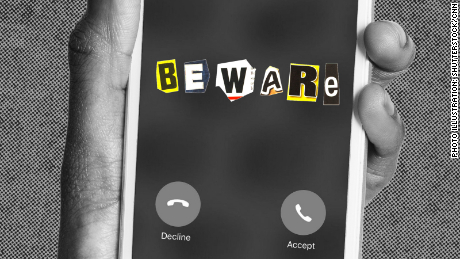Chinese students in Australia are being scammed into faking their own kidnapping

Chinese students in Australia are being coerced by criminal gangs to fake their own kidnappings as part of an elaborate global extortion racket targeting vulnerable overseas communities, authorities said Monday.
Eight students in the state of New South Wales (NSW) were targeted in “virtual kidnapping” scams this year, with overseas relatives paying a total of 3.2 million Australian dollars ($2.3 million) in ransom, police said in a statement.
In one case, the father of a 22-year-old Chinese student in Sydney handed over a more than $1.4 million after being sent a video of his daughter bound in an unknown location.
Another family in China paid more than $14,000 after receiving a video of their 22-year-old relative bound and blindfolded via the messaging app WeChat. She was found by NSW police safe in a hotel room.
The student victims are left “traumatized by what has occurred, believing they have placed themselves, and their loved ones, in real danger,” said NSW Assistant Commissioner Peter Thurtell in a statement.
The NSW police said that scammers were targeting vulnerable members of the Chinese-Australian community, such as international students living away from friends and family in an unfamiliar environment.
There are about 165,000 Chinese students in Australia this year, though the number may be lower due to the coronavirus pandemic; the figure usually hovers between 200,000 and 210,000, according to government figures.
What is virtual kidnapping?
Here’s how the scam works: First, the scammers make calls to random numbers, often speaking in Mandarin. This acts as a kind of filter — Australians who don’t understand Chinese typically hang up, while international Chinese students respond in Mandarin.
Then, the scammers claim to be a Chinese authority, such as a member of the Chinese embassy or police. The scammer convinces the victim they have been implicated in a crime in China, and warn the victim they face extradition to China to face criminal charges in court — or even threaten their families with criminal sanctions if they don’t cooperate.
Scammers often use technology to mask their physical location and to program the host number, so it appears like the call is coming from actual Chinese authorities. If victims look up the caller’s phone number online, it will match the number of Chinese police or the embassy, said Dr. Lennon Chang, a Senior Lecturer in Criminology at Australia’s Monash University.
The scam can then go two ways, according to the NSW police statement. In one scenario, victims are threatened or coerced into transferring money into offshore bank accounts.
In the other scenario, victims are convinced to fake their own kidnappings, and their family is pressed for money. In this case, the scammers order victims to cease contact with their families and friends and rent a hotel room for their own protection and safety. Victims are told to photograph themselves tied up and blindfolded — which are then sent to the victim’s family overseas.
When the family is unable to contact their child in Australia, they then send the ransom payment in exchange for their child’s release. The scammer continues making threats and ransom demands until they can’t obtain any further payments — at which point the victim’s family often reports the incident to police, said the police statement.
The authorities often end up finding the victim safe at home or in a hotel.
Why Chinese students make easy targets
The scam, which has been reported in various other states across Australia like Victoria and Queensland, works well by preying on susceptible, young, often sheltered foreign students.
“International students are the vulnerable group because they don’t have real support in this country,” said Chang. “For this kind of scam, (victims) don’t have a lot of experience with society, so they might believe the so-called ’embassy people.'”
International students also make good targets because they have a home and family elsewhere, Chang said. For scammers, a good victim is “someone with a good connection with people in China, who’ve left China for a long time.”
“If you’re an Australian-born Chinese and someone tells you you’re involved in organized crime in China, you’d tell them to go away,” he added. “But if you’re a Chinese international student, you might be worried about your family, your situation, back in your hometown.”
Among international students, Chinese students are also thought to be uniquely susceptible owing to mainland China’s authoritarian legal system, under which activists, international organizations, and everyday citizens face detention, deportation, or other types of punishment for a wide range of crimes.
Citizens have been arrested for something as innocuous as posting an online video of catching fish while wearing a red scarf. It’s not that far a leap for young international students to imagine the police might be calling for some crime they didn’t know they committed.
Chinese students “tend to follow the authorities … tend to believe the government is always doing the right thing,” Chang said. “So when (victims) have a phone call like this, especially when we’ve double checked the number online, we tend to follow the instructions from the ’embassy people’. It’s definitely a cultural issue here.”
Afterward, victims can be reluctant to report the incident due to shame or embarrassment, said the NSW police.
“Scams take advantage of people’s trust in authorities and fear of doing the wrong thing,” said the Australian Federal Police in a statement. “Victims can feel an array of emotions — from helplessness and humiliation to anger and guilt — but it’s important to know you are not to blame and there is help at hand.”
NSW police said they are working with the state government and Chinese Embassy in Australia to investigate and warn the community of these scams.
Authorities are urging students and other any potential victims to report such calls to their universities, embassies, or local police, and not to respond to the callers’ demands.
Scams around the world
While these kinds of scams have been reported for years, authorities said they appeared to be increasing.
“Virtual kidnappings … have developed considerably over the last decade by transnational organized crime syndicates,” said NSW Detective Chief Superintendent Darren Bennett in a statement.
Last year, there were 1,172 reports of what police call “Chinese authority” phone scam across Australia. It’s unclear how many of these were attempts to coerce fake kidnappings or the other scenario of depositing money into offshore accounts, and if all were successful.
Authorities said scammers targeted Chinese international students, in particular, but they also tried Australian and international victims from non-English speaking backgrounds.
The 2019 scams saw a loss of more than 2 million Australian dollars ($1.43 million), according to NSW police.
In 2018, the federal police said there were nearly 1,700 scam calls reported, resulting in losses of nearly 1.2 million Australian dollars ($855,000).
Similar scams have been reported across the United States, targeting Chinese students and other minorities.
The Chinese Consulate General of Chicago warned in 2018 that some of the more sophisticated scammers have even hacked into the mission’s phone lines, calling or leaving voice messages to victims in the consular district.
That year in Canada, three students went missing in the Toronto area, prompting a citywide search. They were later found by police, who said it was likely a faked kidnapping ordered by scammers.
Unfortunately, these types of crimes are very difficult to investigate due to the use of encrypted messaging apps, techniques to alter host phone numbers, hacking and offshore accounts, Australian detective Bennett said in a news conference on Monday.
“Our message today is one of prevention,” he said. “The overwhelming message is to don’t pay any money … Call the authorities, or just hang up.”






